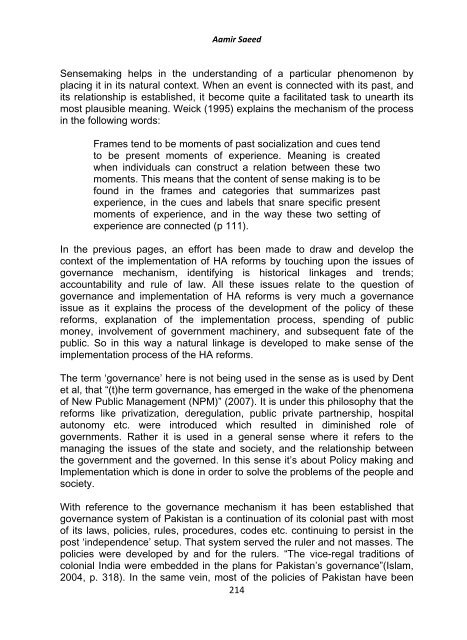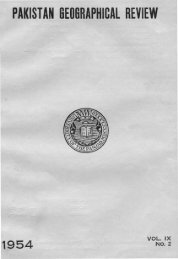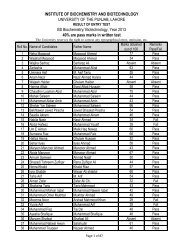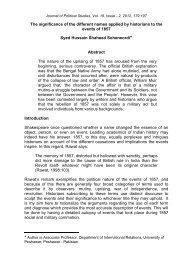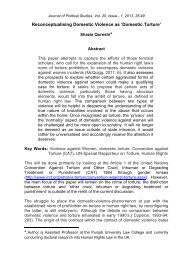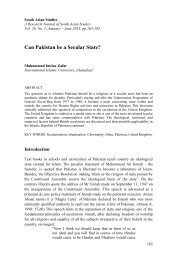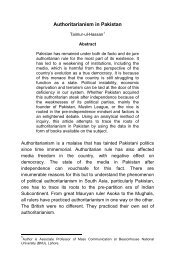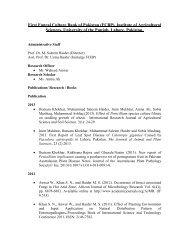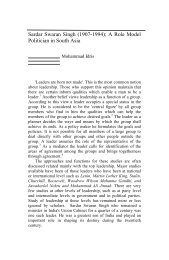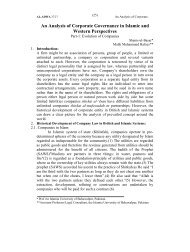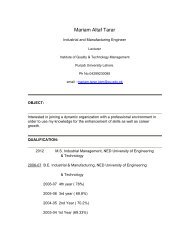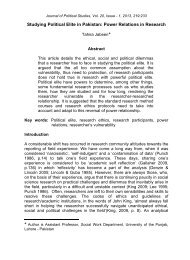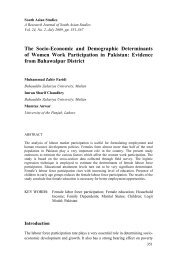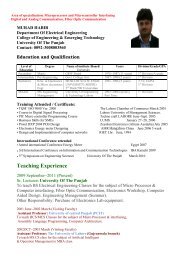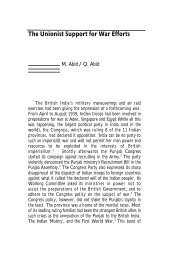Continuation of Colonial Policies by Aamir Saeed - University of the ...
Continuation of Colonial Policies by Aamir Saeed - University of the ...
Continuation of Colonial Policies by Aamir Saeed - University of the ...
Create successful ePaper yourself
Turn your PDF publications into a flip-book with our unique Google optimized e-Paper software.
<strong>Aamir</strong> <strong>Saeed</strong><br />
Sensemaking helps in <strong>the</strong> understanding <strong>of</strong> a particular phenomenon <strong>by</strong><br />
placing it in its natural context. When an event is connected with its past, and<br />
its relationship is established, it become quite a facilitated task to unearth its<br />
most plausible meaning. Weick (1995) explains <strong>the</strong> mechanism <strong>of</strong> <strong>the</strong> process<br />
in <strong>the</strong> following words:<br />
Frames tend to be moments <strong>of</strong> past socialization and cues tend<br />
to be present moments <strong>of</strong> experience. Meaning is created<br />
when individuals can construct a relation between <strong>the</strong>se two<br />
moments. This means that <strong>the</strong> content <strong>of</strong> sense making is to be<br />
found in <strong>the</strong> frames and categories that summarizes past<br />
experience, in <strong>the</strong> cues and labels that snare specific present<br />
moments <strong>of</strong> experience, and in <strong>the</strong> way <strong>the</strong>se two setting <strong>of</strong><br />
experience are connected (p 111).<br />
In <strong>the</strong> previous pages, an effort has been made to draw and develop <strong>the</strong><br />
context <strong>of</strong> <strong>the</strong> implementation <strong>of</strong> HA reforms <strong>by</strong> touching upon <strong>the</strong> issues <strong>of</strong><br />
governance mechanism, identifying is historical linkages and trends;<br />
accountability and rule <strong>of</strong> law. All <strong>the</strong>se issues relate to <strong>the</strong> question <strong>of</strong><br />
governance and implementation <strong>of</strong> HA reforms is very much a governance<br />
issue as it explains <strong>the</strong> process <strong>of</strong> <strong>the</strong> development <strong>of</strong> <strong>the</strong> policy <strong>of</strong> <strong>the</strong>se<br />
reforms, explanation <strong>of</strong> <strong>the</strong> implementation process, spending <strong>of</strong> public<br />
money, involvement <strong>of</strong> government machinery, and subsequent fate <strong>of</strong> <strong>the</strong><br />
public. So in this way a natural linkage is developed to make sense <strong>of</strong> <strong>the</strong><br />
implementation process <strong>of</strong> <strong>the</strong> HA reforms.<br />
The term ‘governance’ here is not being used in <strong>the</strong> sense as is used <strong>by</strong> Dent<br />
et al, that “(t)he term governance, has emerged in <strong>the</strong> wake <strong>of</strong> <strong>the</strong> phenomena<br />
<strong>of</strong> New Public Management (NPM)” (2007). It is under this philosophy that <strong>the</strong><br />
reforms like privatization, deregulation, public private partnership, hospital<br />
autonomy etc. were introduced which resulted in diminished role <strong>of</strong><br />
governments. Ra<strong>the</strong>r it is used in a general sense where it refers to <strong>the</strong><br />
managing <strong>the</strong> issues <strong>of</strong> <strong>the</strong> state and society, and <strong>the</strong> relationship between<br />
<strong>the</strong> government and <strong>the</strong> governed. In this sense it’s about Policy making and<br />
Implementation which is done in order to solve <strong>the</strong> problems <strong>of</strong> <strong>the</strong> people and<br />
society.<br />
With reference to <strong>the</strong> governance mechanism it has been established that<br />
governance system <strong>of</strong> Pakistan is a continuation <strong>of</strong> its colonial past with most<br />
<strong>of</strong> its laws, policies, rules, procedures, codes etc. continuing to persist in <strong>the</strong><br />
post ‘independence’ setup. That system served <strong>the</strong> ruler and not masses. The<br />
policies were developed <strong>by</strong> and for <strong>the</strong> rulers. “The vice-regal traditions <strong>of</strong><br />
colonial India were embedded in <strong>the</strong> plans for Pakistan’s governance”(Islam,<br />
2004, p. 318). In <strong>the</strong> same vein, most <strong>of</strong> <strong>the</strong> policies <strong>of</strong> Pakistan have been<br />
214


